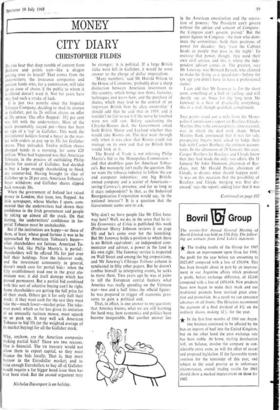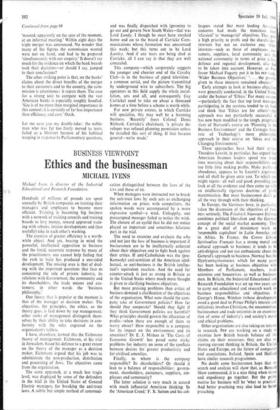CITY DIARY MONEY
CHRISTOPHER FILDES
Do you hear that deep rumble of content from Holborn and points east—like a dragon purring over its hoard? That comes from the underwriters; the insurance companies and pension funds who, for a commission, will take up an issue of shares if the public to whom it is offered doesn't want it. Not for years have they had such a stroke of luck.
It is just two months since the Imperial Tobacco Company, deciding to shed its interest in Gallaher, put its 26 million shares on offer at 20s apiece. The offer flopped : 35f per cent was left with the underwriters. Most of the stock presumably stayed put—there has been no sign of a lap' in Gallaher. This week the institutional holders found a buyer in the mar- ket with orders to pay up to 35s for Gallaher shares. They unloaded. Twelve million shares changed hands in a morning, for some £20 million. What had happened was that American Tobacco, in the process of outbidding Philip Morris for control of Gallaher, had decided to buy a large enough shareholding to block any counter-bid. Having brought its slice of Gallaher up to 28 per cent, American Tobacco's buyer withdrew; and Gallaher shares slipped back towards 30s.
When the government of Ireland last raised money in London, that issue, too, flopped. An Irish newspaper, whose blushes I spare, com- mented that the underwriters had shown their confidence in the Irish government and people by taking up almost all the stock. On that footing, the underwriters' confidence in Im- perial Tobacco must be unshakeable.
But if 'the institutions are happy—or those of them, at least, whose good fortune it was to be approached by American Tobacco's buyer— other shareholders are furious. American To- bacco's bid, like Philip Morris's, is partial: shareholders will be offered 35s for just over half their holdings. Now the takeover code, and the investment community in general, doesn't much care for partial bids: when the City establishment used one in the great alu- minium war, it did itself damage which has proved permanent. But a partial bid combined with this sort of selective buying can't be right. Some shareholders are getting the full price for all their stock. Others get it for only half their stock: if they want cash for the rest they must take the—much lower—market price. The take- o er panel, which so far has given its imitation of an unusually taciturn mouse, must squeak up or pack up. It may well ask American Tobacco to bid 35s.(or the weighted average of its market buying) for all the Gallaher stock.
Why, anyhow, are the American companies making partial bids? There are two reasons. One is financial. The us treasury would not allow them to export capital, so they must finance the bids locally. That is, they must borrow in the Eurodollar market; and to raise enough Eurodollars to buy all of Gallaher would require a far bigger bond issue than has ever been tried. But the second argument may Nicholas Davenport is on holiday. be stronger : it is political. If a large British stake were left in Gallaher, it would be some answer to the charge of dollar imperialism.
`Many members,' said Mr Harold Wilson to the House of Commons, 'probably draw a sharp distinction between American investment in this country, which brings new firms, factories, techniques and know-how, and the purchase of shares, which may lead to the control of an important British firm by alien ownership.' I should add that he said that in 1959, and it wouldn't be fair to use it if the nerve he touched were not still raw. Before sanctioning the Chrysler-Rootes deal, the Government asked both British Motor and Leyland whether they would take Rootes on. The deal went through only when it was clear that Rootes could not manage on its own and that no British firm would look at it.
The Board of Trade is not referring Philip Morris's bid to the Monopolies Commission— and that doubtless goes for American Tobac- co's. But monopoly isn't really the question. Do we want the tobacco industry to follow the car and computer industries: one big British- owned company and a scatter of Americans— saving Carreras's presence, and for so long as it stays independent? Is that, as the Industrial Reorganisation Corporation would say, 'in the national interest'? It is a question that the Government seems sure to ask.
Why don't we have people like Mr Eliot Jane- way here? Well, we do, in the sense that he is: his Economics of Crisis is published this week (Professor Harry Johnson reviews it on page 93) and he's come over for the launching. But Mr Janeway holds a position to which there is no British equivalent : an independent com- mentator and adviser, a power in the land in his own right. The Janeway service is respected on Wall Street and among the big corporations, and Mr Janeway's Chicago Tribune column is syndicated in fifty other papers. But he doesn't confine himself to interpreting events, he seeks to move them. Two years ago be was at pains to tell the European central bankers what America was really spending on the Vietnam war—two and a half times the official figure: he was prepared to trigger off economic pres- sures to gain a political end.
That, in effect, is one answer to my question; that America knows, what we are still learning the hard way, how economics and politics have become inseparable. But another answer lies in the American constitution and the separa- tion of powers: 'the President can't govern without the advice and consent of Congress : the Congress can't govern, period.' But the senior figures in Congress—the men who dom- inate the committees—hold their positions of power for decades: they 'treat the Cabinet heads as people that pass in the night.' To exercise that power, though, they need their own civil service, and this is where the inde- pendent adviser conies in. The greatest, says Mr Janeway. was Bernard Baruch, who claimed to make his living as a speculator—'before the tax age you didn't have to have a professional status.'
I can add that Mr Janeway is, for the short term, something of a bull of sterling, and will shortly say so. Since for the long term Mr Janeway is a bear of practically everything, this is a real, though qualified, compliment.
Two points stand out a mile from the Mono- polies Commission's report on Barclays-Lloyds- M artins. One is the extraordinary, almost casual, way in which the deal took shape. When Martins Bank announced that it was for sale, prospective buyers were asked to lodge their bids with Cooper Brothers, the eminent accoun- tants. In the afternoon of 29 January this year, Cooper Brothers let Barclays and Lloyds know that they had made the only two offers. On 31 January Mr John Thomson, chairman of Bar- clays, met Mr Harald Peake, chairman of Lloyds, to discuss what should happen next : 'it was on this occasion that the possibility of Barclays and Lloyds merging was first dis- cussed,' says the report; adding later that it was Continued on page 102 Continued from page 99 'mooted, apparently on the spur of the moment, at an informal meeting.' Within eight days the triple merger was announced. No wonder that many of the figures the commission wanted were not on hand, and had to be prepared 'simultaneously with our enquiry.' It doesn't say much for the evidence on which the bank boards took their decisions—or should I say, jumped to their conclusions?
The other striking point is that, on the banks' claims about the direct benefits of the merger to their customers and to the country, the com- mission is unanimous: it rejects them. The case for a strong unit to compete with the vast American banks is especially roughly handled. 'Size is of no more than marginal importance in this context; it is certainly of far less importance than efficiency and cost.' Ouch.
Let me save y ou my double-take : the noble- man who was far too freely moved to tears, failed as a Minister because of his habitual weeping in response to Parliamentary questions, and was finally dispatched with ignominy to go out and govern New South Wales—that was Lord Lundy. I though he must have sneaked home and on to the board of Carricke Com- munications whose formation was announced this week; but this turns out to be Lord Lumley. And if any tears are being shed at Carricke, all I can say is that they are well concealed.
This company—which corporately suggests the younger and cheerier end of the Cavalry Club—is in the business of piped television : a common aerial, and the picture transmitted by underground wire to subscribers. The big operators in this field supply the whole instal- lation, sets and all, and consequently (say Carricke) need to take on about a thousand homes at a time before a scheme is worth while.
For new private estates, in which Carricke will specialise, this may well be a booming business. 'Recently' (says Colonel Denis Richard, Carricke's chairman), 'a private de- veloper was refused planning permission unless he installed this sort of thing. If that became general—we're made.'







































 Previous page
Previous page